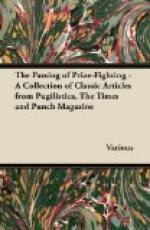Then, if a careless House some day
Permit the Channel Tunnel
boring,
Think how this railway line would pay;
If you had shares you’d
cease deploring.
Think of the cotton-laden trains
Direct from Manchester to
Asia!
Think of the Sheffield Railway’s
gains,
Not of your lilac or acacia!
* * * * *
“ONE TOUCH OF NATURE.”
To introduce in a monument to a great writer a presentment of one of his most popular characters, as Mr. F. EDWIN ELWELL has done in his bronze statue of “Charles Dickens and ’Little Nell,’” is decidedly a pretty notion. “The child,” looking up into the face of the great creative genius, who loved this offspring of his sympathetic fancy better than did all her other admirers, is a pathetic figure, and gives to the monument a more human and less coldly mortuary aspect than, unhappily, is usual in such work. It is a “touch of Nature” that makes even the adjunct of the mausoleum akin to the quick world of the living and loving. The vivid valiant genius, who so detested and denounced the superfluous horrors with which we surround death and the tomb, would cordially have approved it, little as was his love for monumental effigies, or care for the fame that is dependent on them.
* * * * *
VERY “FRENCH BEFORE BREAKFAST.”—It was reported in the Times that a M. ROULEZ fought four duels between nine and ten on Wednesday morning, severely wounded his four adversaries, and then, after this morning’s pleasure, went about his business, that is his ordinary business, as if nothing particular had happened. To this accomplished swordsman the series of combats had been merely like taking a little gentle exercise “pour faire Rouler le sang.” The combatants, as it turns out, appear to have been like Falstaff’s “men in buckram.”
* * * * *
THE LIMB AND THE LAW.—“To whom does an amputated limb belong?” queries the Standard (a propos of the case of the boy HOUSLEY, whose father demanded that the arm cut off in the Infirmary should be given up to him). The answer is clear. An amputated limb belongs to no body!
* * * * *
IN DEFENCE OF THE GREAT PARADOXIST.
He may not be “earnest,” he
may not be “smart,”
You may say, if you please,
he’s unable to sing;
But, oh, you must own he’s
a “work of art,”—
A “beautiful untrue
thing!”
* * * * *
ASPIRATIONS.—A Music-hall Manager told the Parliamentary Committee sitting on Theatres and Places of Entertainment, that he did not believe in Art with a capital A. Perhaps he believed in Art with a capital H?
* * * * *
[Illustration: THE ROYAL PARLIAMENTARY TOURNAMENT; OR, THE SESSION ENDS IN SMOKE.]




